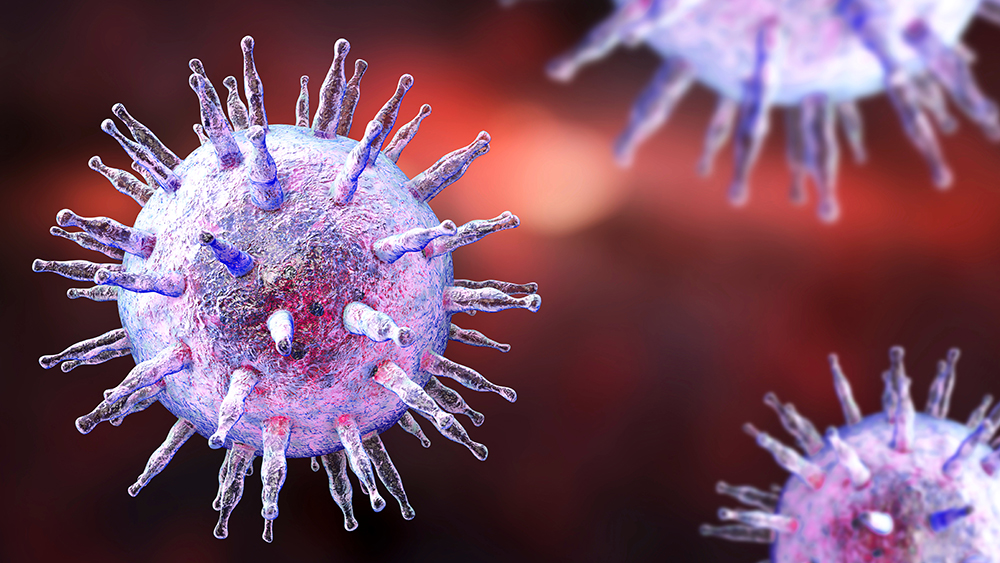
Researchers have found that having chronic viral infections like EBV (illustrated above) may influence the likelihood of someone developing Long COVID and what symptoms they might have.

Researchers have found that having chronic viral infections like EBV (illustrated above) may influence the likelihood of someone developing Long COVID and what symptoms they might have.
What you need to know
In a small study supported by the National Institute of Allergy and Infectious Diseases (NIAID), researchers found that chronic viral infections may influence the likelihood of someone developing Long COVID. They also found that different chronic infections were associated with the development of different Long COVID symptoms.
What did the researchers do?
Some viruses cause underlying chronic infections. These viruses stay inactive in our bodies without making us sick and can then reactivate if the body is dealing with another infection, or if it is under stress. The reactivated virus can produce symptoms, especially in people with weakened immune systems. Viruses that can cause chronic infections include HIV, herpesviruses like cytomegalovirus (CMV), and Epstein-Barr virus (EBV).
Researchers wanted to see whether people with these underlying chronic infections were more likely to develop Long COVID, especially if these viruses had reactivated or infected someone around the same time they developed COVID-19. They interviewed 280 people who had Long COVID and took blood samples to determine whether they had a chronic infection and whether that infection would have been active at the same time they were infected with SARS-CoV-2.
The likelihood of someone developing Long COVID was influenced by the underlying chronic infection they had, researchers found. For example, people with a reactivated EBV infection were more likely to develop Long COVID, while people with a reactivated CMV infection were less likely to develop severe Long COVID (defined as having five or more symptoms associated with Long COVID).
The researchers also found that different symptoms of Long COVID seemed to be related to different underlying infections. For example, people with HIV were more likely to develop memory and concentration issues, while people who had reactivation of one of the herpesviruses were more likely to show fatigue. People with CMV were also less likely to have memory and concentration symptoms.
Why is this research important?
The results of this study are preliminary, but the research may show that there are distinct types of Long COVID and that a person’s biological makeup could influence whether they develop long-term symptoms and what kinds of symptoms they have after SARS-CoV-2 infection. Future studies of Long COVID and chronic viral immune responses will be needed to fully understand how these conditions influence each other.
Where can I go to learn more?
Study Looks for Long COVID Risk Factors
-
Researchers have discovered factors that are associated with an increased risk of Long COVID.
Long COVID or Post-COVID Conditions
-
The Centers for Disease Control and Prevention share current information on Long COVID symptoms and how they can be managed.
-
The U.S. Department of Health and Human Services provides information on resources for people with symptoms of Long COVID that cause physical or mental impairment.
Sources
Peluso, M. J., Deveau, T., Munter, S. E., Ryder, D., Buck, A., Beck-Engeser, G., Chan, F., Lu, S., Goldberg, S. A., Hoh, R., Tai, V., Torres, L., Iyer, N. S., Deswal, M., Ngo, L. H., Buitrago, M., Rodriguez, A., Chen, J. Y., Yee, B. C., … & Henrich, T. J. Impact of pre-existing chronic viral infection and reactivation on the development of long COVID. Preprint. https://doi.org/10.1101/2022.06.21.22276660

News and Stories
Read stories about the efforts underway to prevent, detect, and treat COVID-19 and its effects on our health.
 An official website of the United States government
An official website of the United States government

